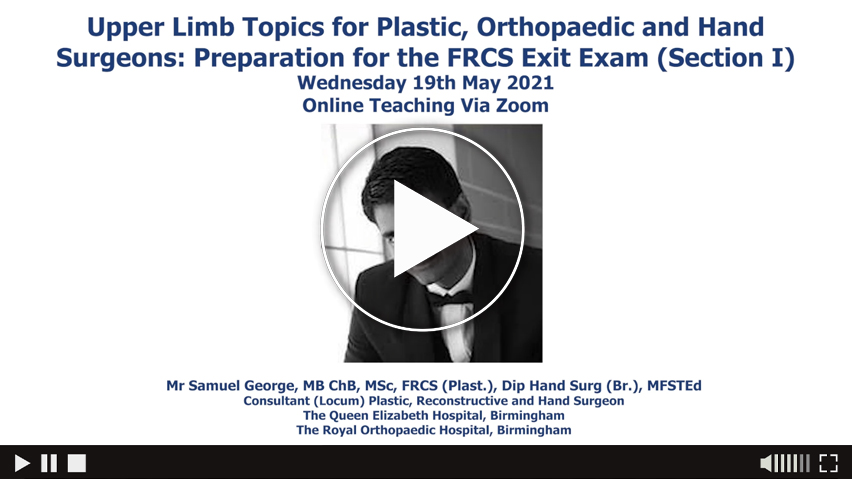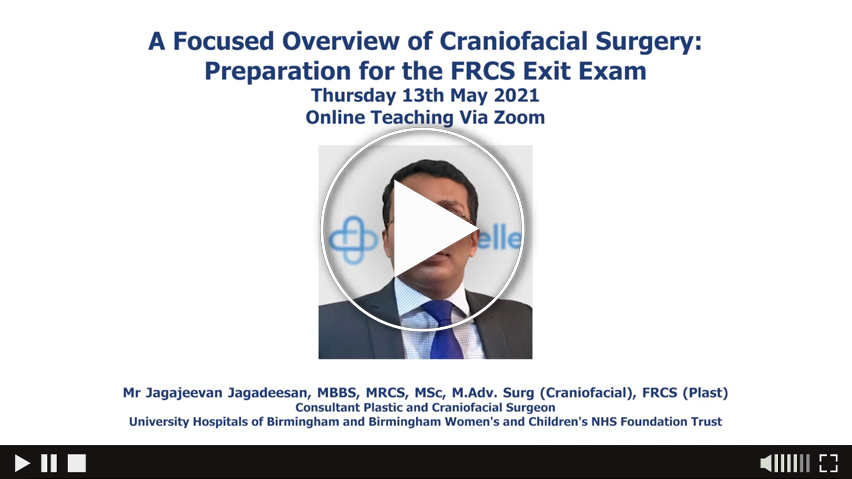This resource is available for members of Doctors Academy. Membership to Doctors Academy is free. Please click here to become a member.
Upper Limb Topics for Plastic, Orthopaedic and Hand Surgeons: Preparation for the FRCS Exit Exam (Section I)
About
Upper limb conditions are extensively tested in the FRCS exam. These can include simple hand conditions, such as a ganglion or trigger finger, to moderately complex conditions, such as the management of a rheumatoid hand or Dupuytren’s disease. More complex management, such as that for brachial plexus injuries, nerve paralysis requiring tendon or free muscle transfers, hand fractures, conditions affecting the carpal bones, congenital hand conditions, and bone tumours, are also tested in sufficient depth in the exam. This talk by Mr Sam George, Consultant Plastic, Reconstructive and Hand Surgeon at the Queen Elizabeth Hospital, Birmingham and the Royal Orthopaedic Hospital, Birmingham, will cover the salient aspects of the above topics. It will discuss the main principles behind formulating a management plan for these conditions, as tested in the FRCS exam (Section I).
Speaker
Mr Samuel George, MB ChB, MSc, FRCS(Plast.), Dip Hand Surg(Br.), MFSTEd
Consultant (Locum) in Plastic, Reconstructive and Hand Surgeon
The Queen Elizabeth Hospital, Birmingham and the Royal Orthopaedic Hospital, Birmingham

This resource is available for members of Doctors Academy. Membership to Doctors Academy is free. Please click here to become a member.
A Focused Overview of Craniofacial Surgery: Preparation for the FRCS Exit Exam
About
Many craniofacial abnormalities (CFA) result from abnormal development of the 1st and 2nd visceral arches, which form the facial bones and ears during the second month of gestation. The aetiological factors include a number of genetic syndromes, as well as prenatal environmental factors. CFAs can impact swallowing, breathing, hearing, vision and speech; in some neonates, they can result in life-threatening airway compromise. The assessment and management of CFAs is tested in the FRCS Exit Exam. This talk by Mr Jagajeevan Jagadeesan, who is an experienced Consultant Plastic and Craniofacial Surgeon at the University Hospitals of Birmingham, will cover the classification of craniofacial anomalies, craniosynotosis, common craniofacial syndromes, the management, and surgical techniques for correction. It will provide a structured algorithm to prepare for the FRCS Exit Exam.
Speaker
Mr Jagajeevan Jagadeesan, MBBS, MRCS, MSc, M.Adv. Surg (Craniofacial), FRCS (Plast)
Consultant Plastic and Craniofacial Surgeon
University Hospitals of Birmingham and Birmingham Women's and Children's NHS Foundation Trust
